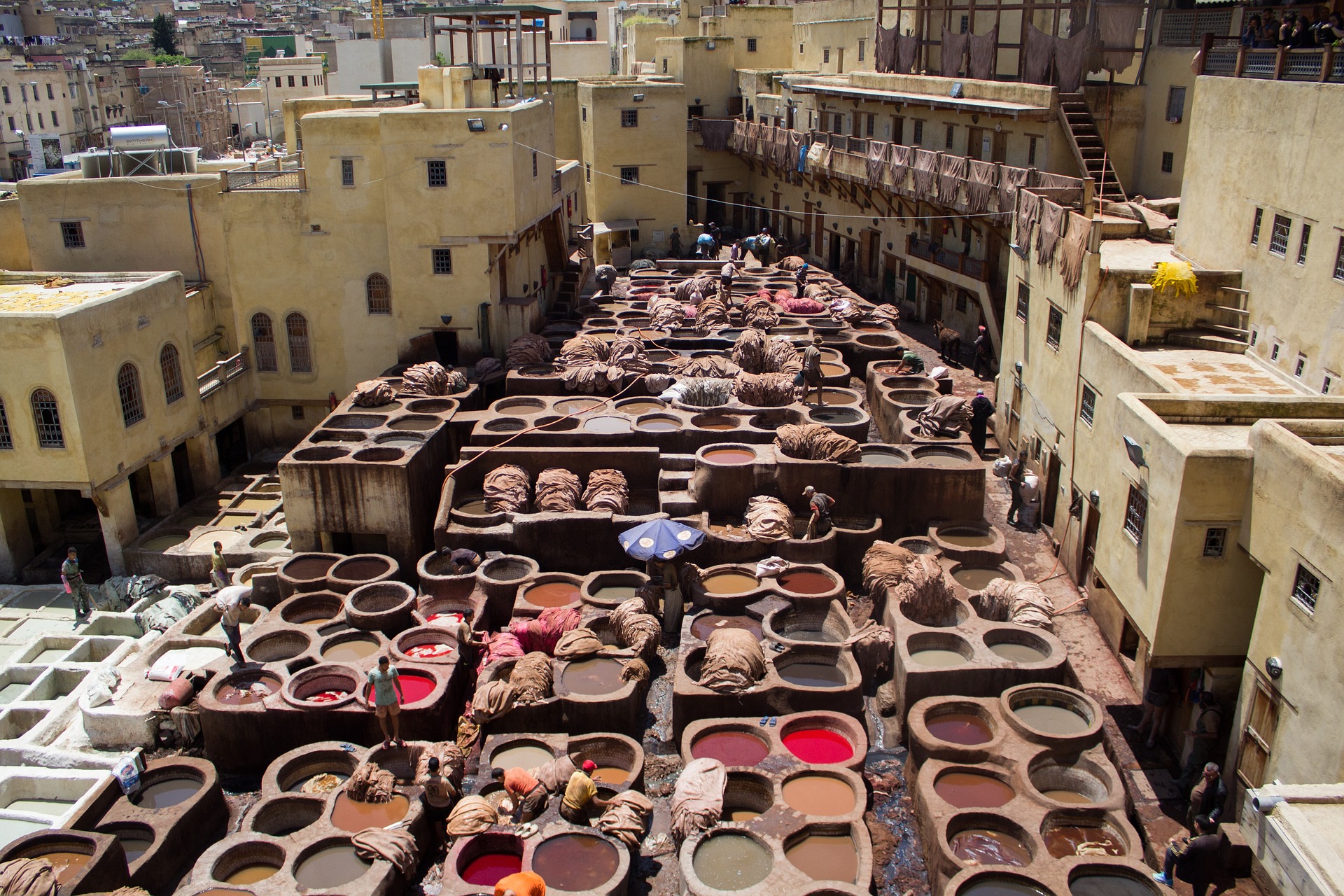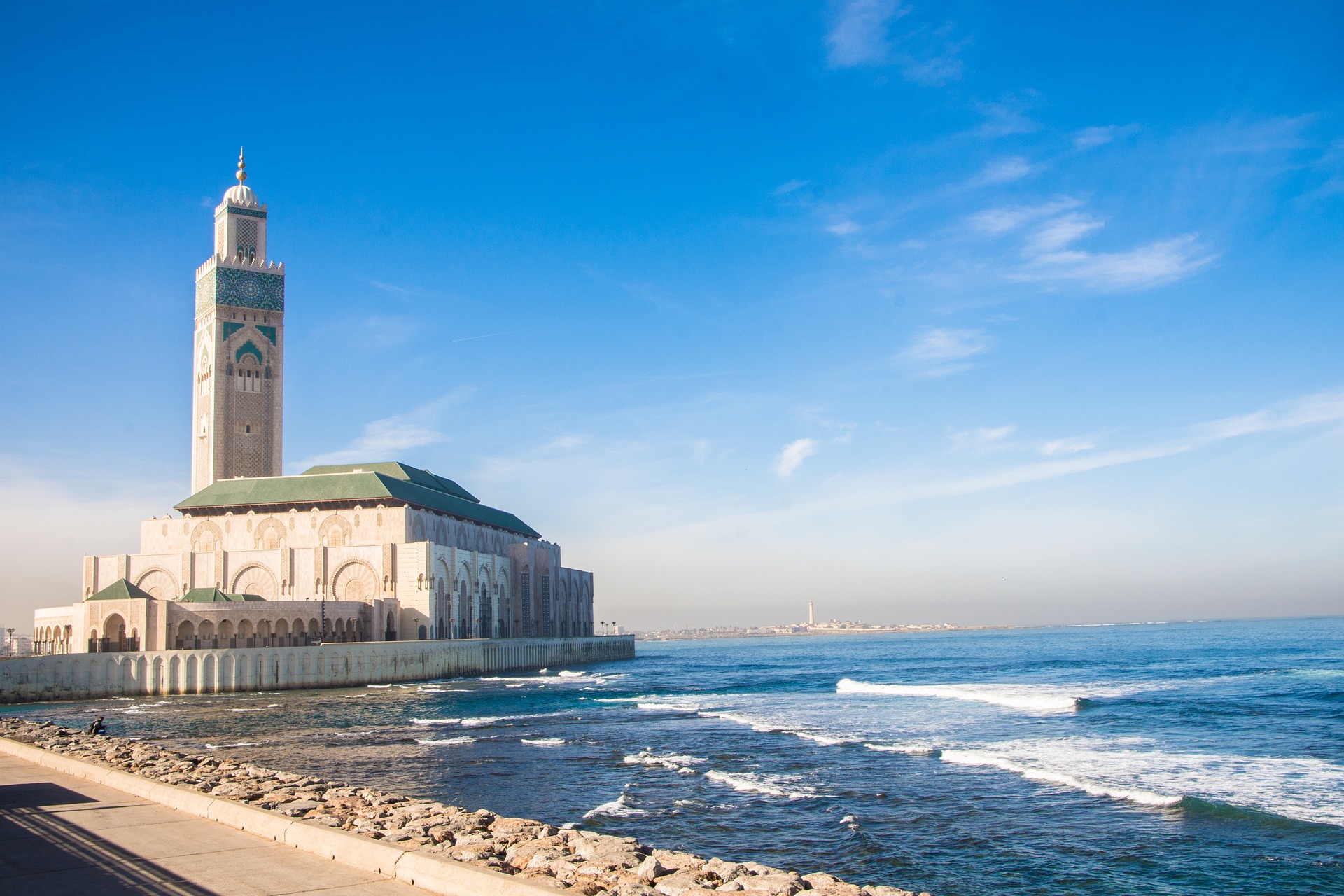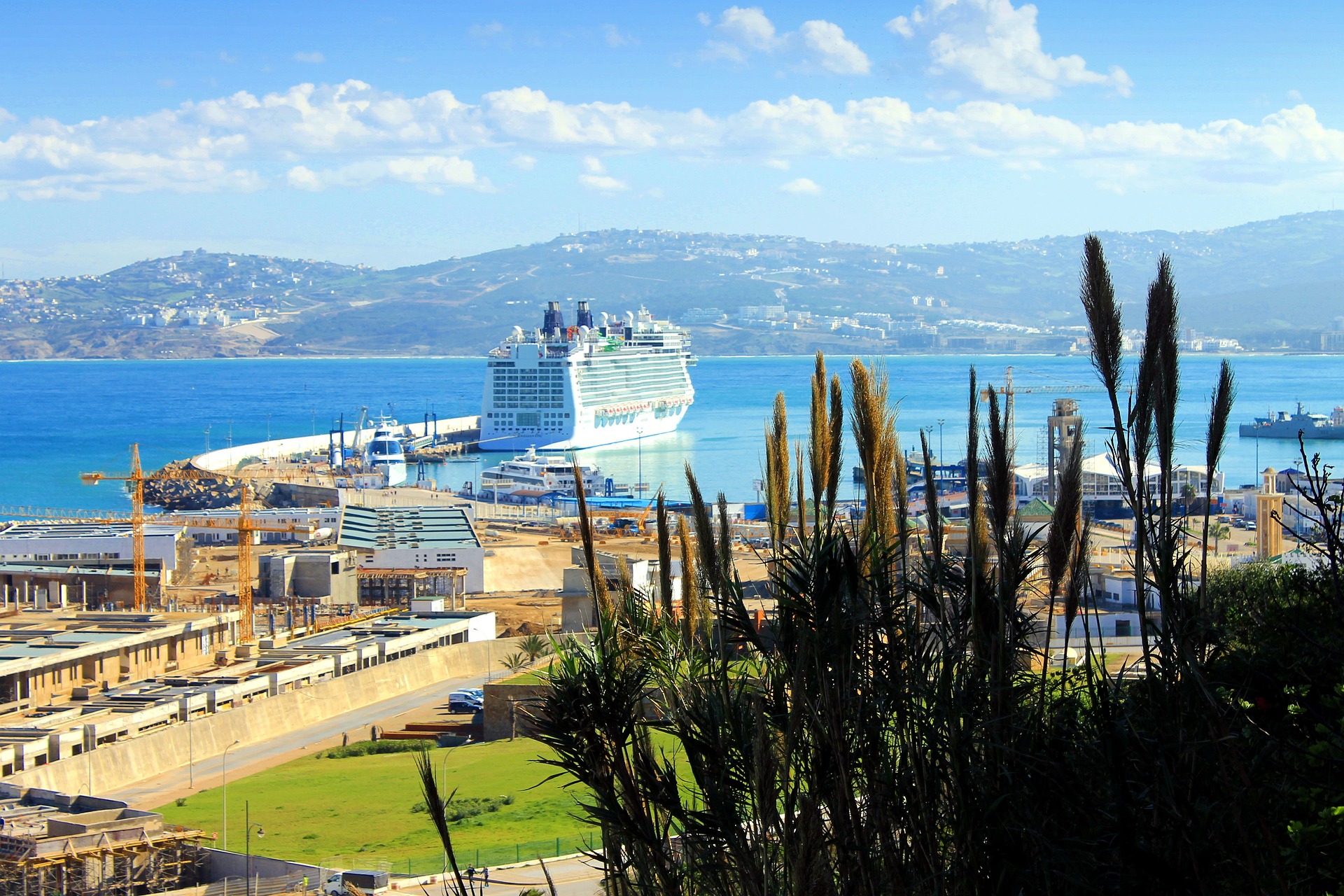Alpha Morocco Tours
Morocco is a country of extremes. It has something for everyone, from the snow-capped heights of the Atlas Mountains to the brilliant sands of the Sahara Desert, from the bustling medinas of historic cities to the peaceful villages of the countryside.
About Alpha Morocco Tours
Continuous fun
From the busy city of Marrakech to the imperial city of Fez, from the ancient ruins of Volubilis to the majestic grandeur of the Toubkal Mountains, our Morocco trips will take you on a voyage of discovery.
You'll get the opportunity to see Morocco in a very authentic way with our small group excursions, as you'll be accompanied by a knowledgeable local guide who will share their insights into Moroccan culture and history.
We offer a tour for everyone, whether you're interested in history, culture, food, or adventure. So, what are you holding out for? Begin arranging your Moroccan holiday right away!
Alpha packages
Discover the Best of Morocco with Alpha Tours
Tours from Marrakech
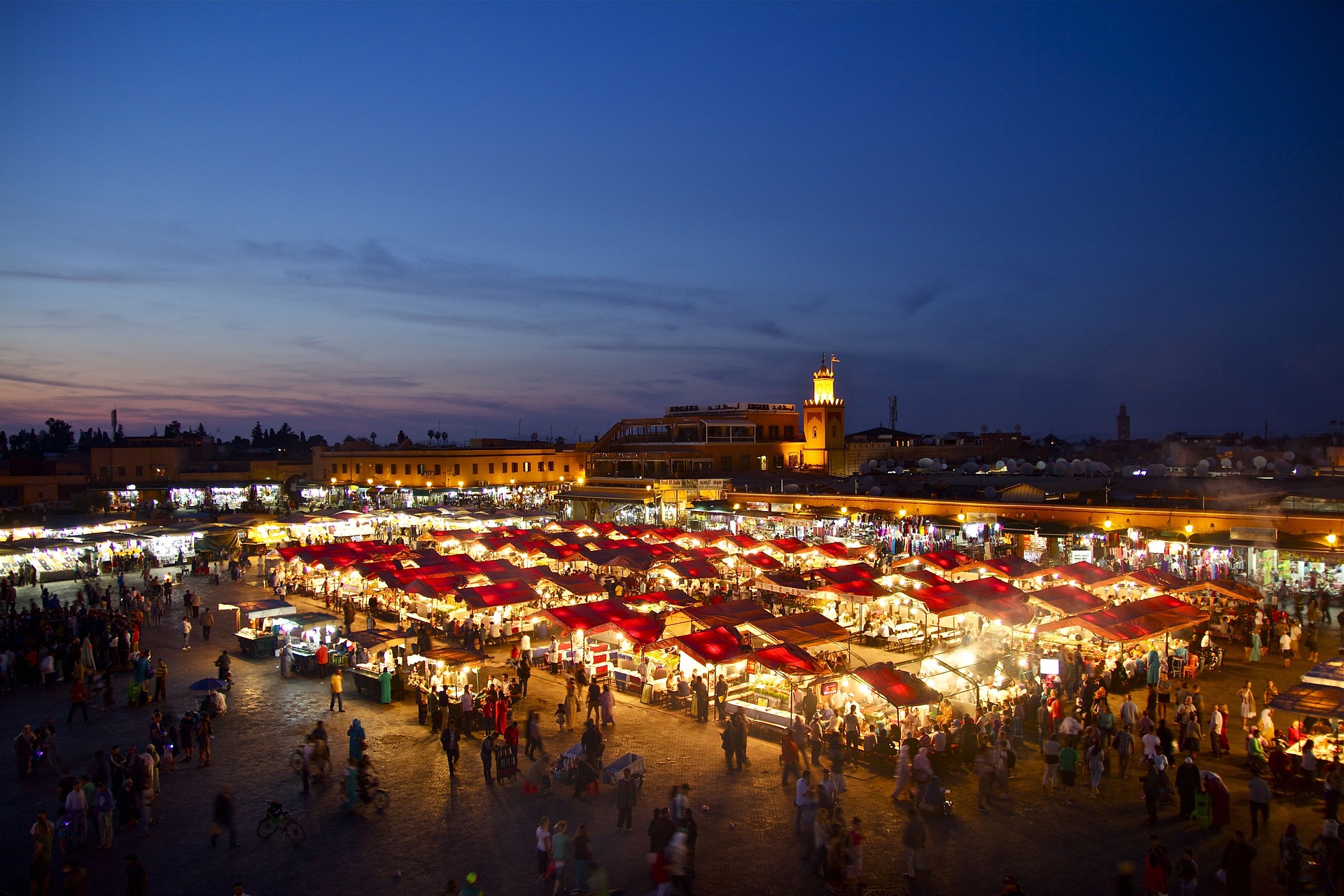
- 2 days from Marrakech to Zagora
- 3 days from Marrakech to Merzouga
- 3 days from Marrakech to Fes
- 3 days from Marrakech to Chegaga
- 4 days from Marrakech to Fes
- 4 days from Marrakech to Chefchaouen
- 5 days from Marrakech to Erg Chebbi
- 6 days from Marrakech to Chefchaouen
- 6 days from Marrakech around Morocco tour
- 6 days from Marrakech to Tangier
- 9 days from Marrakech to Tangier
- 10 days from Marrakech around Morocco tour
Tours from Casablanca
Morocco: Port of amusement
Morocco is a North African country that borders the Atlantic Ocean and the Mediterranean Sea. It is a stunningly beautiful land, with snow-capped mountains, lush woods, and wide deserts. Morocco also has a rich cultural and historical heritage, with a distinct blend of Arab, Berber, and European influences.
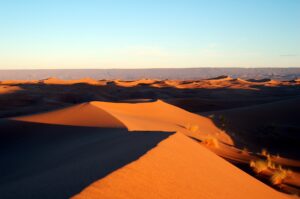
Some of the most popular tourist destinations in Morocco include:
- Marrakech: The “Red City” of Marrakech is a vibrant and exciting city with a rich history and culture.
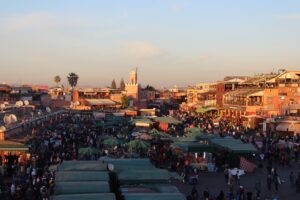
- Fez: Fez is a UNESCO World Heritage Site and one of the oldest cities in Morocco. It is known for its medina (old city), which is a maze of narrow streets and shops.
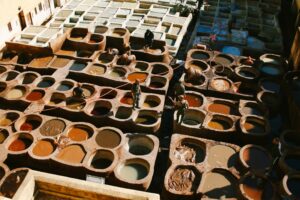
- Chefchaouen: The “Blue City” of Chefchaouen is a beautiful town nestled in the Rif Mountains. It is known for its blue-washed buildings and its relaxed atmosphere.
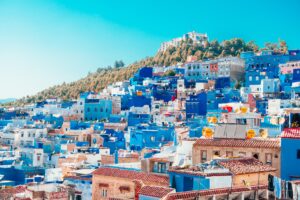
- Essaouira: Essaouira is a coastal town with a long history as a port city. It is known for its windsurfing and its medina, which is a UNESCO World Heritage Site.
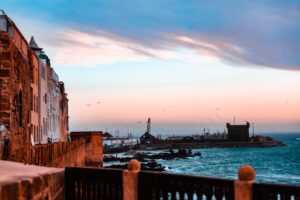
- The Sahara Desert: The Sahara Desert is the largest desert in the world, and Morocco is home to a part of it. You can go on camel treks, sand dune bashing, or simply relax in the desert and enjoy the peace and quiet.
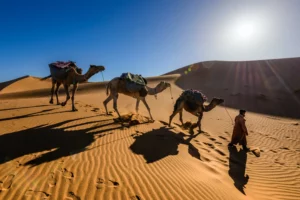
Morocco: A special destination
Morocco is an incredibly intriguing destination that boasts a wealth of diverse attractions and experiences, making it an ideal getaway for everyone. Whether you are a history buff, culture enthusiast, nature lover, or someone who enjoys soaking up the sun and enjoying some relaxation, Morocco has something for everyone. From the stunningly preserved ruins of ancient cities to the vibrant bustle of its colorful markets, Morocco is a country full of contrasts, excitement, and rich diversity. With friendly locals, delicious food, and awe-inspiring landscapes, a trip to Morocco is an opportunity to immerse yourself in a completely different culture while exploring a fascinating place. So, if you’re looking for a destination that will tantalize all your senses and leave you with countless unforgettable memories, Morocco is definitely worth considering.
Moroccan: Cuisine
Moroccan cuisine is a blend of various cultures, including Arab, Berber, European, and Mediterranean influences. It is known for its bold and exotic flavors, spices, and herbs. Moroccan dishes often use meat and vegetables, combined with fragrant spices, such as cumin, paprika, saffron, and ginger. Couscous, a dish made from semolina wheat, is a staple food in Moroccan cuisine, while tagine, a slow-cooked stew, is also very popular. Moroccan cuisine also incorporates a variety of nuts, fruits, and olives. Mint tea is a common beverage served with meals and is often paired with sweet pastries. Overall, Moroccan cuisine has a unique taste that is worth exploring.
Moroccan History
Morocco has a vast and rich history that dates back to the Paleolithic Age. Berbers, Phoenicians, Romans, Arabs, and Europeans have all lived in the nation over the years.
Morocco was invaded by the Arabs in the 7th century, who introduced Islam to the region. The Almoravid and Almohad dynasties, which controlled Morocco in the 11th and 12th centuries, were among the most formidable empires in the Islamic world.
Morocco was ruled by the Saadi dynasty in the 16th century, who were succeeded by the Alaouite dynasty in the 17th century. The Alaouites are Morocco’s current reigning dynasty.
Morocco has been a relatively independent country throughout its history, however it has recently been influenced by Europe. Morocco was forced to open its ports to European trade in the nineteenth century, and it was divided into French and Spanish protectorates in the early twentieth century.
Morocco obtained independence in 1956 and has been a constitutional monarchy since then. Morocco’s current monarch is Mohammed VI.
Morocco’s eclectic culture, which is a blend of Arab, Berber, and European influences, reflects its rich and complex history. Morocco is a famous tourist destination, with several historical attractions, such as the old city of Fez and Marrakech’s medina, attracting travelers.
Moroccan Culture
Moroccan culture is a fusion of Arab, Berber, and European elements. It is a highly Islamic culture, yet it is also open to other religions and civilizations.
Some of the most prominent features of Moroccan culture are:
- Islam: Islam is Morocco’s official religion, and it plays a vital role in Moroccan culture. Moroccans are proud of their Islamic background and adhere to Islam’s five pillars.
- Family: In Moroccan society, the family is the most significant unit. Moroccans appreciate family bonds and frequently live close to their extended families.
- Hospitality: Moroccans are well-known for their friendliness. They are always delighted to welcome visitors into their homes and will go out of their way to make them feel at ease.
- Moroccan art and music: Moroccan art and music represent the country’s unique cultural background. Moroccan art is noted for its vibrant colors and elaborate patterns, and Moroccan music is a fusion of Arab, Berber, and European influences.
- Food: Moroccan food is a delectable fusion of Arab, Berber, and European influences. It’s bursting with flavor and spices, and there’s something for everyone.
Morocco is an enthralling country with a complex culture. If you want to learn more about Moroccan culture, I recommend that you go to Morocco and experience it for yourself.
Here are some more facts regarding Moroccan culture:
- Language: Morocco’s official languages are Arabic and Berber. However, French is commonly spoken, particularly in cities.
- Clothing: Moroccan apparel is often loose-fitting and composed of natural textiles. Djellabas, or long, flowing robes, are commonly worn by men. Kaftans are long, loose-fitting garments worn by women.
- Etiquette: Moroccans are welcoming people who expect guests to respect their culture. It is crucial to dress modestly and avoid making any inappropriate gestures when visiting Morocco.
Moroccan Travel Tips
Morocco is a lovely and fascinating nation with plenty to see and do. However, it is critical to plan ahead of time. To assist you plan your vacation, here are some Moroccan travel tips:
- When to go: Because Morocco has a Mediterranean climate, the best months to visit are spring (April-May) and fall (September-October). During these months, the temperature is moderate and there are fewer people.
- Where to go: Morocco has a lot to offer travelers, so plan ahead of time what you want to see and do. Marrakech, Fez, Chefchaouen, Essaouira, and the Sahara Desert are among the most popular tourist sites.
- Getting about: There are several ways to move about Morocco. You can fly into a major city like Casablanca or Marrakech and then take a train, bus, or taxi to your location. You can also rent a car, but keep in mind that the roads can be difficult.
- What to pack: Morocco is a warm country, so bring light clothing. Pack sunscreen, sunglasses, a hat, and insect repellent as well. If you intend to visit the desert, you need also bring warm clothing.
- Money: The Moroccan dirham (MAD) is the country’s currency. In Morocco, you can exchange your currency for MAD at the airport or at a bank.
- Visas: Most countries’ citizens require a visa to enter Morocco. A visa can be obtained via the Moroccan embassy or consulate in your home country.
- Safety: Morocco is a safe country, but remain wary of your surroundings, especially in crowded locations. You should also avoid carrying significant sums of money or valuables.
- Culture: Because Morocco is a Muslim country, it is critical to respect Moroccan culture and customs. This includes dressing modestly and refraining from public shows of affection.
